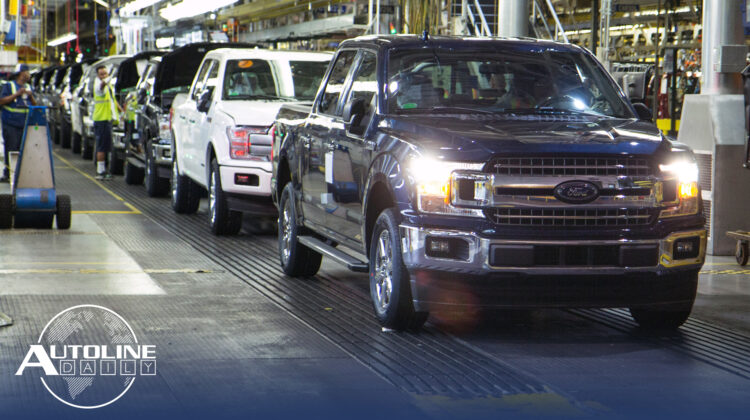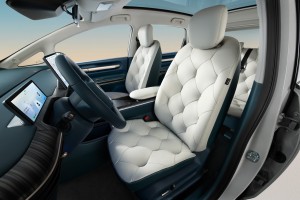
Listen to “AD #3625 – UAW Wipes Out $20 Billion Of Ford, GM Market Cap; California Approves Robotaxis; EV Sales Not Falling in U.S.” on Spreaker.
Follow us on social media:
Runtime: 10:28
0:00 UAW Wipes Out $20 Billion Of Ford, GM Market Cap
1:24 Chinese OEMs Should Demolish Foreign Automakers: BYD
2:23 EV Sales Not Falling in U.S.
3:15 California Gives Robotaxis The Green Light
4:03 Ford Targets $5,000/Truck in Software Services
5:12 Ford Issues Software Hack Patch
6:08 Auto Industry Races into Silicon Carbide
6:57 Baojun Seats Are as Comfy as They Come
8:04 Honda Recycles Work Uniforms into Sound Insulation
Visit our sponsors to thank them for their support of Autoline Daily: Bridgestone, Intrepid Control Systems, Schaeffler and Teijin.
This is Autoline Daily, the show dedicated to enthusiasts of the global automotive industry.
UAW WIPES OUT $20 BILLION OF FORD, GM MARKET CAP
The UAW has already wiped out $20 billion in market capitalization at Ford and General Motors as investors are spooked by the union’s audacious demands. By the way, UAW president Shawn Fain is the one who calls them audacious, not just us. Ever since contract negotiations started last month and the union began publicly announcing its demands, Ford’s market cap fell 19% while GM’s is down 15%, at the same time that the Dow Jones Industrial average rose 2%. In contrast, the stock price and market cap of Stellantis barely budged. But that could change. Bloomberg cites unnamed sources, likely sources from within the car companies, who say if the UAW got everything that it wants it would drive labor costs to $150 an hour and cost the Detroit Three an extra $80 billion a year. And that could force the companies out of business. So it’s unlikely the union is going to get everything it wants, but investors are still worried about how much it will get.
CHINESE OEMs SHOULD DEMOLISH FOREIGN AUTOMAKERS: BYD
Chinese automakers should band together and demolish the foreign car companies. That’s according to Wang Chuanfu, the CEO of BYD. He actually said they should “demolish the old legends” but it’s easy to see who he’s talking about. At a ceremony to celebrate making BYD’s 5 millionth NEV, Chuanfu stood in front of an image with the logos of the 12 largest domestic automakers in China. He said they should band together under the slogan “Chinese Autos.” Reuters reports that his message went viral in China with strong support. But others pointed out this could cause problems for Chinese automakers overseas, especially in Europe. France is trying to rally the EU to impose higher tariffs on Chinese EVs, which it says are being dumped in Europe at below market costs.
EV SALES NOT FALLING IN U.S.
Are EV sales falling in the U.S.? Cox Automotive says no, they’re not. While numerous reports have fixated on the growing inventory of EVs, with an average of over 100 days’ supply, EVs continue to gain market share. They hit 8.6% retail market share in June, which is about twice as much as the same period a year ago. But sales vary greatly by region. In California, EV sales are booming. But in Montana they’re virtually nonexistent. Automotive News reports that all the early adopters have already come into the market and now automakers need to sell electrics to more mainstream customers. So while sales and market share are growing, they’re probably going to grow at a slower rate.
CALIFORNIA GIVES ROBOTAXIS THE GREEN LIGHT
Cruise and Waymo just got a huge boost. The California Public Utilities Commission voted in favor of allowing them to operate autonomous robotaxis in San Francisco with no restrictions. The decision goes into effect immediately, meaning they can now charge for public rides, at all times of the day. Up until now, they were limited to where and when they could operate in the city. But not everyone is happy with the decision with regulators facing pushback from San Francisco’s transportation and safety agencies as well as some residents. They wanted to delay approval because they said more time is needed to show the vehicles are safe, but obviously, the commission did not agree with them.
FORD TARGETS $5,000/TRUCK IN SOFTWARE SERVICES
Every automaker talks about making more money by selling software services and upgrades, but Ford is putting an actual number on it. Reuters reports that the CFO of Ford’s commercial division, called Ford Pro, hopes to get $4,000 – $5,000 more in the future on every van and truck it sells to businesses. It thinks they’ll pay for services that are tailor-made for fleets, including safety, security, self-driving and insurance. The biggest growth for Ford will start around 2026, which is when its next-gen commercial EVs launch with a new intelligence platform. By that time, Ford Pro wants to boost the number of connected vehicles to roughly 60% and the number of vehicles with paid services to 36%.
FORD ISSUES SOFTWARE HACK PATCH
Ford will soon issue a software patch to prevent some of its vehicles from being hacked. A researcher at Texas Instruments, which supplies Ford with Wi-Fi software, discovered a vulnerability with the software used in Ford’s Sync 3 infotainment system. Ford says there’s no evidence that anyone has hacked into the vehicles. It says it would require significant expertise and that the hacker would have to be near the vehicle when its ignition and Wi-Fi are on. Plus, they would only have access to the vehicle’s infotainment system because it’s protected from things like braking, steering and throttle. Even so, Ford wanted to fix the vulnerability and will make the patch available online for download, which can be installed via a USB. In the meantime, owners can turn off the Wi-Fi in their vehicle if they’re concerned.
AUTO INDUSTRY RACES INTO SILICON CARBIDE
Silicon carbide chips make electric vehicles more efficient compared to regular silicon chips. So the auto industry is racing to make more of them. Automotive News reports that several Tier 1 suppliers like Bosch, ZF, BorgWarner and Magna are investing heavily into silicon carbide chips by securing supplies from other chip makers or making their own. Bosch expects the market to explode in the coming years, estimating it could grow by 30% annually with more EVs hitting the market. One reason suppliers are scrambling to lock up supplies now is because the chips take longer to make because of the difficulty and expense of creating silicon carbide synthetically.
BAOJUN SEATS ARE AS COMFY AS THEY COME
Here’s some seats that look really inviting. Baojun, which is one of the brands under GM’s joint venture in China, revealed its third EV, a 4-door almost SUVish-looking vehicle that’s being aimed at families. It’s called the Yun Duo, which means ‘cloud’ in Chinese and that helps explain these pillow-y, hand-sewn seats or what Baojun calls ‘Cloud Sofa.’ The interior also features a nice two-tone color scheme and two floating digital display screens. The EV will be offered with one of two batteries; either 37.9 kWh or 50.6 kWh. It doesn’t say what chemistry they are, but that they provide ranges of 360 kilometers or 223 miles and 460 kilometers or 285 miles. The Yun Duo comes standard with a 100-kW electric motor and will be priced between roughly $13,000 and $17,000.
HONDA RECYCLES WORK UNIFORMS INTO SOUND INSULATION
Honda’s workers will literally give you the shirts off their backs. The company started a unique recycling program where old uniforms worn by workers at U.S. plants and R&D centers are chopped up and turned into sound-absorbing insulation that is then used in Honda’s and Acura’s cars. Honda uses about 45,000 pounds of uniforms a month, which otherwise would end up in a garbage dump. Honda has a goal of using 100% sustainable materials in its vehicles in the future.
But that’s the end of today’s show. Thanks for joining us and I hope you have a great weekend.
Thanks to our partner for embedding Autoline Daily on its website: WardsAuto.com
Seamus and Sean McElroy cover the latest news in the automotive industry for Autoline Daily.






